Economy, Ecumenes, Communism:
Economy as the Devastation of Ecumenes, Communism as the Exit From the Economy
Jacques Fradin
Printable version here.
In what follows, we’ll consider the economy (of) capitalism, its “economic” character even more than its “capitalist” one, as the major force of destruction of spaces and forms of life (ecumenes).
The economy-capitalism as an expansive bloc of colonization—of bodies as well as minds.
The economy considered, therefore, as a laying-waste.
We’re going to start by positing the sameness of capitalism and the economy, of what we’ll call economy-capitalism (and not capitalist economy). Or to be perfectly clear: economy = capitalism.
And I’ll add this statement: there’s no non-capitalist economy or alternative economy, whether social or socialist, nor is there a communist or any other (alter) economy. Non-capitalism is non-economy, and communism is radically non-economic.
Further, to put it differently, there doesn’t exist any recoverable economy behind or underneath capitalism.
Starting from this proposition, we’ll arrive at the idea that the economy is a wrecking machine, and that in order to combat this destructive bloc it’s necessary to leave the economy, live communism and deploy anarchy.
This destruction can present itself in various ways: continuous primitive accumulation, internal civil war, extermination of non-economic forms of life, etc.
But it’s crucial to recognize that economy is a devastation: social or socialist economy is just as disastrous as economy-capitalism, as the capitalism that is thought of as “vampirizing the economy” (imagined to be above the economy, as a cancerous or parasitical superstructure besetting the “good economy”).
Economy is constituted and develops through the annihilation of every non-economic form of life, since for its regular operation economy needs a reduced, well-formed type of human, self-seeking and thus predictable individuals who can be counted on and are accountable for their actions. Reliability and accountability are the twin necessities for functional economy.
Of course economy implies a fanatical utilitarianism, but it requires much more: universal calculation, the penetration of the accountable mental form into the most intimate regions of every human being, transformed into (self-evaluable) capital. What is sometimes called the “religion of money” is more radically the “religion of economy”, of the rational scientific evaluable self-evaluable.
The struggle against this devastation of free forms of life implies that we exit from economy, implies political heresy or social secession.
It implies the solid construction of fighting communes and not the cobbling together of alternative economies, be they social, socialist or even communist, or other market socialisms or social market economies.
The economic alternative is not adequate to the situation, being unintelligible and hence dangerous, as is shown by the repeated failures of alternatives organized around an “alter” system of production, obviously still economic (and hence capitalist). The huge failure of socialist economy, and of its capitalist involution, should serve us as a warning signal.
Fighting against the economic devastation implies the construction of non-economic communes. The an-archic communism of these communes is the red thread with which this intervention is woven.
The main theme of devastation and exit from it will be laid out in six parts.
1. The economy is a despotic political regime that was set in motion by the economic liberalism of the Physiocrats (the economists of the cult) as early as the 18th century.
2. This political regime has been actualized, beginning in the 1930’s, in cybernetics or in the idea of the authoritarian technocratic government of experts (the core of fascism).
3. Economic technocracy can be presented as the power of the committee of “industrial” engineers, engineers working for the well-being of humanity.
The Saint-Simonian industrialist Second Empire, defined as the French origin of European fascism, is the moment when economic technoscience identified itself with the political technoscience of the engineers. This authoritarian moment is decisive, in particular for the attraction it will exert on “social reformers” and “philanthropists” as diverse as Proudhon or Le Play, committed reformers, drawn to practical projects in the social justice domain.
4. The finest flowering of this technocracy is planning, planning via the market, which we can call neoliberalism. So it’s essential to see that plan and market or State and market (or company) are not separate but integrated, forming a “synergy” (precipitating a synarchy). The figure of the liberal planner is symptomatic. It enables one to trace a genealogy leading from planning (from market socialism) to neoliberalism.
This part will be the most important and will allow us to open the debate on the West, viewed as a realized metaphysics.
5. All these developments will make it clear that alternative economy is a mirage, but an economist mirage.
That mirage can be captured by looking at the genealogy of the social State, a genealogy that takes us from the Second Empire (once again) to participationist Gaullism by way of the (Vichyist) French State of the corporations; a genealogy that lays down an Ariadne’s thread leading us from Proudhon and Walras to Pareto, to the Italian school of market socialism, then to (French, Italian, Spanish) fascism.
6. We’ll then be able to close by trying to understand the sense of this economy that wrecks everything, through a critical analysis of value.
Where value, evaluation, thought as the outcome of a measurement, which is to say, of an internment, can no longer relate (positively) to “labor”—labor value – but signifies economic despotism (introduced at the start of my intervention).
Each of the six parts will be illustrated by genealogies (of which I have offered brief examples), interlinked genealogies that attempt to map out the Western eco-Nomic.
This West that prides itself on having given the present of economy to all of humanity, a RICH present, the present of wealth, a GIFT for all humankind.
The West boasts of showing the way out of material misery, flashing the American way of life before our eyes, the way to construct the affluent society, the true society of liberty, of liberation from material constraints.
But the gift of economy offered by the West to the whole world, appearing as a scientific and/or humanitarian contribution, a universal contribution, contains the poison of the worst technocratic despotism.
Necessitating an exit from economy, not in order to invent an alternative (even more efficient or humanitarian) economy, but to constitute a new anarchic communist form of life.
It is not enough to abandon capitalism and reclaim “the good economy” (whether social, socialist, or alter). It is necessary to constitute a non-economic political ethic at a great cost; without being able to seek in a mythical state of nature or an illusory primitive (already economic?) communism any source of “resourcing”.
Combat is our only salvation.
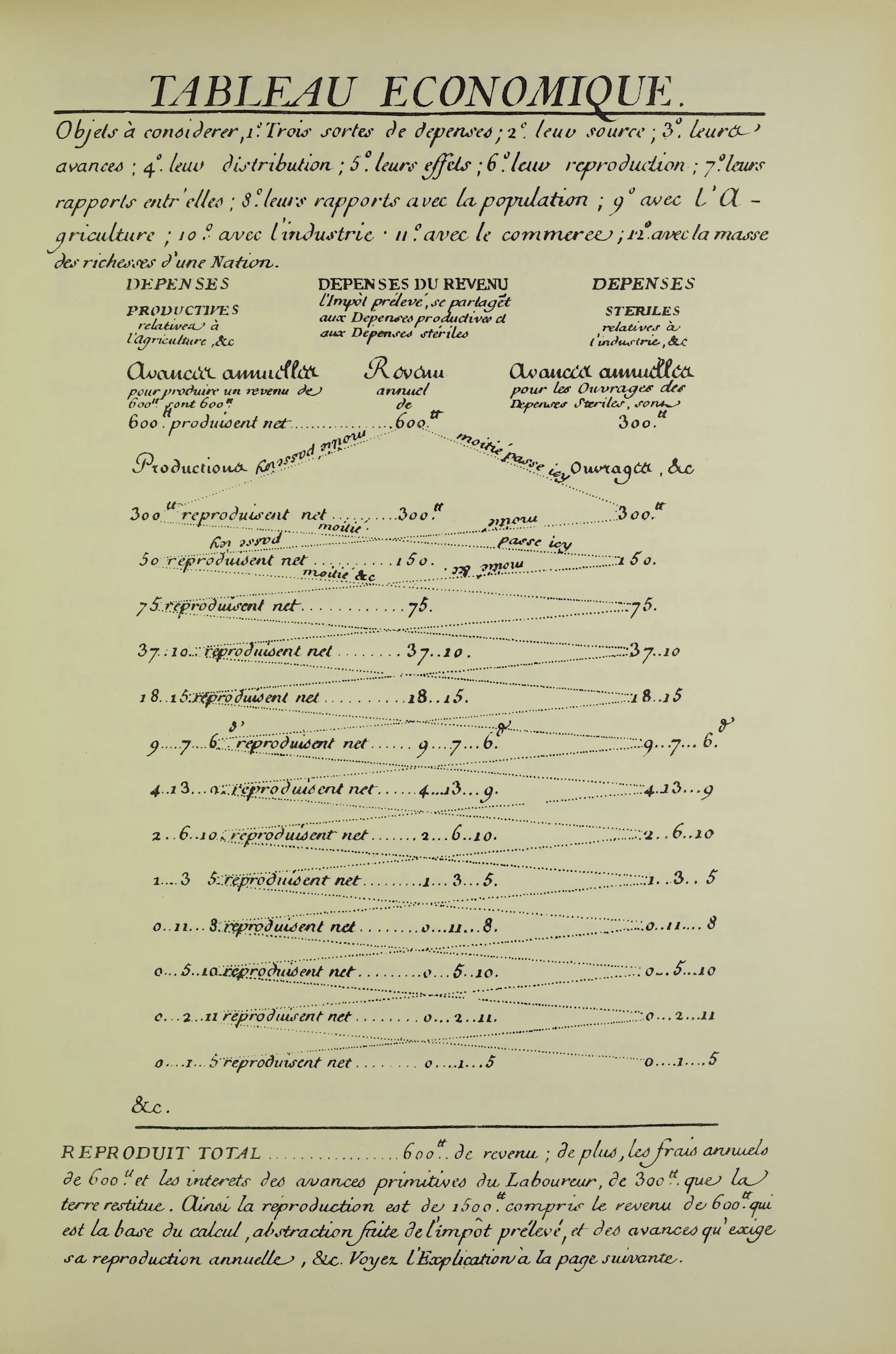
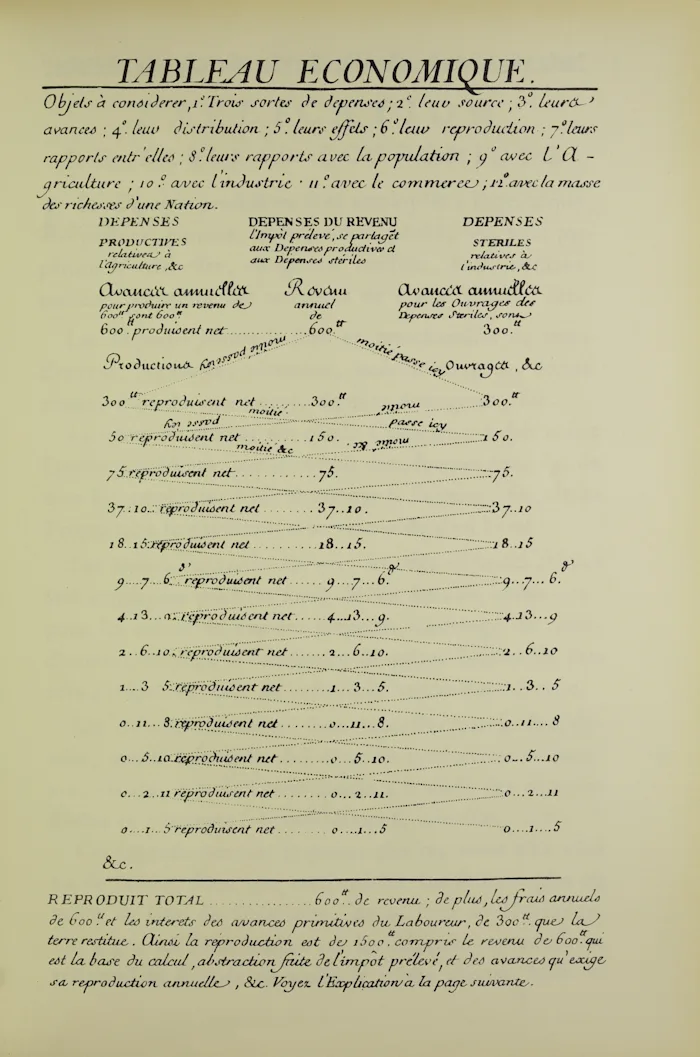
Quenay’s “Tableau Economique” (1767)
I. The economy is a despotic political regime launched by the economic liberalism of the Physiocrats.
So we’re going to immediately consider the economy as a political regime, constituted by and for War, a regime that can only be characterized, at the outset, as economic DESPOTISM.
Or, following the theodicy of the physiocratic founding fathers (Quesnay, 1750), this regime can only be called an “enlightened Despotism”, a despotism of (eco-Nomic) rationality, of techno-scientific reason, a technocracy.
In the economy, the indisputable authority of the company heads is legitimated by managerial or economic technoscience, or by technical “expertise”. There’s nothing political in this (paternalist or employer’s) “natural authority”, they say.
Paraphrasing Heidegger, we can say: the political regime connected with expansive economy or development is that of TECHNOCRACY, the political regime of economic technoscience. Technocracy, the École Polytechnique sort of technocracy, whose (neo-classical or post-Physiocratic) economic science, the systematic science of the automatic market or the megamachine called “market economy”, is the supporting mythology.
In the 18th century the Physiocrats created economic science to justify liberalism, a kind of naturalism that is at the root of all economism. So they invented a techno-political science whose objective was clearly interventionist, normative or performative.
And this normative trait–economic science doesn’t describe an “existing reality” but prescribes a “superior reality” — this trait persisted, compact, up to our day (post –Physiocratic neo-classical theory is normative).
Returning first to the Physiocrats is perhaps the best way to comprehend intrinsically physiocratic, empiricist materialist economy, economy as performed by physiocratic technoscience. The future neoclassical science (after 1850), still dominant today, the technoscience of market economy being already contained in this physiocratic thought (of 1750).
Take good note of this new identity: physio-cracy=eco-nomy (all for the stomach).
What did physiocracy establish?
Economy as the overall organization of life and as the superior organization of that life.
Economy conceived as way of life, starting with the physiocratic liberal economist initiative – this projected economy was immediately disastrous inasmuch as it was posited as “rational”, “scientific”, and even responsive to the invisible hand of Providence.
(We know that the Physiocrats were fervent Leibnizians and that economy was integral with a theodicy, a program of JUSTICE –first key genealogy.)
Indisputable (the juridical term “irrefragable,” incontrovertible, is a Physiocratic leitmotif), rational, scientific, theological, etc. Economy can only be authority, authoritarian eco-Nomie. Usurping the imaginary authority of _la Science_for political, technocratic ends.
To be specific, the Physiocrats invented basic economy, the idea of techno-economic material infrastructure.
They invented the techno-political mode of production of subsistence (read: subsistence=physio-cracy, that which forms the basis of material life, the stomach), the economy capable of ensuring “material life” and eventually abundance, capable of freeing the best humanity from the human by solving mankind’s oldest problem, that of material misery, famine, illness, old age. Salvific economy promising the longer and longer good life. Economy progressing toward its own withering away through the complete realization of the utopia of abundance.
Let me indicate straight off that Marx subscribed to this physiocratic program. Even the older Marx of the Critique of the Gotha Program continued to think in a physiocratic, economistic way: the realm of freedom begins where the realm of necessity ends…economic necessity, obviously.
So economics presents itself from the outset (as early as 1750) as a meta-technics. It shares with technics a sense of the pragmatic, of efficiency, of the grandiose realizable. And economic realism will always remain the most formidable injunction, that of the “doable.”
But beyond technics, it presents itself as the global order of the technical world, a systematic political technology.
It is the schema for the comprehensive organization of techniques into a technological system, a system named “market economy,” a system revolving around an enormous social machine (a political megamachine), the automatic regulative or machinic market.
It is crucial to understand that for Physiocratic or neoclassical economics, the market is a political mechanism of superorganization of piecemeal techniques, manifesting an overall plan.
Market and plan do not stand apart but are coordinated with each other (planning VIA the market is the economist objective).
Moreover, economic science prescribes the market plan, the technical organigram, designed to make this market amenable to mass production by machine (in a socio-political factory), one that is manipulable, reproducible, etc. Economic science, the systematic political science of the market or the market economy is a techno-political tool for the social Engineers of the “super-management” of planning.
What is the pivot of this political technique emphatically named “The Market”?
The pivot is market PRICE.
A number, fantasized as an essential “scientific” term; thus reducing science to the numerically calculable.
This price is what authorizes the political economic social order.
Price is a miraculous number enabling the comparability, the homogenization, the SUPER-PHYSICAL (and meta-physical) ordering of the physical techniques involved in the economy (which is to say, all of them!)
Once the economy is envisaged as a (meta-physical) meta-technique there appears the central figure of colonizing economic development: the Saint-Simonian Engineer, the master of efficiency, of performance.
The master of meta-technical super-management is the polytechnicien engineer, the key conceptual figure of the deployment, the development of so-called “industrial capitalism”, that is, “capitalism” brought down to its universal economic foundation. And of course this foundation being a meta-physical BASIS (arche, command), this material technical economics is valid for every “alternative economics”, every alternative of a different, social or socialist, economy, or a “humanized” alter-capitalism.
For this metaphysical, super-physical construction of the social political body, capitalism, for example in the negative sense of purely speculative finance capital, either doesn’t exist, or is unimportant, or should be leveled, and could be by returning to the eco-Nomic ground (in a command position).
For there is only one scientific mode of organization. And as the only effective, superior, etc. mode of organization, the economy (and its economic science) implies the eradication of every other form of life.
That is why, it bears repeating, this economist way of life with its necessary geo-controlled human type, this technocratic mode implies authoritarianism (the meritocracy of experts), discipline (productive, eventually Stakhanovist, discipline), submission to science, inequality (as what generates efficiency and the mania for winning), expertocracy, in short, the indisputable reign of technoscience, a reign propagated by economic development.
But why would this be disturbing?
Don’t people want, ever since prehistoric (or Daoist) men, abundance and a long consumerist life? Grow and multiply!
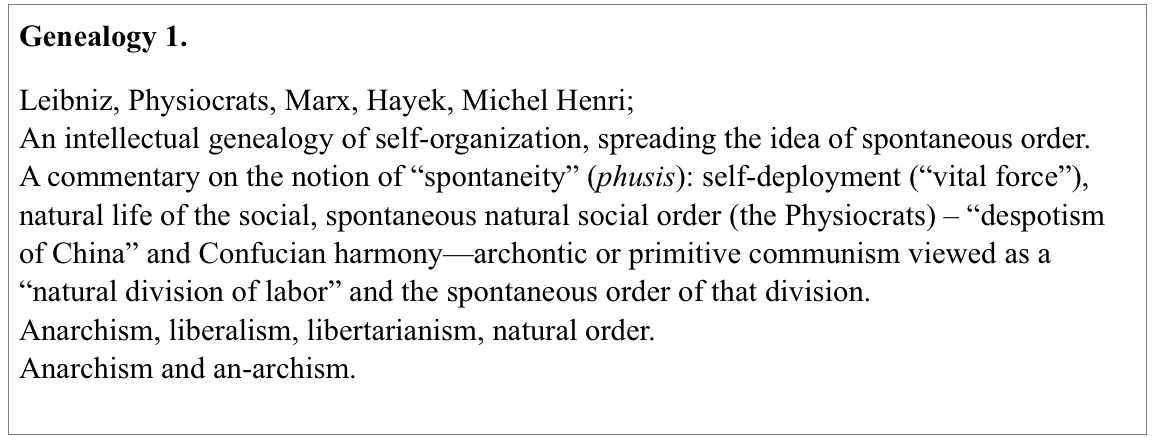
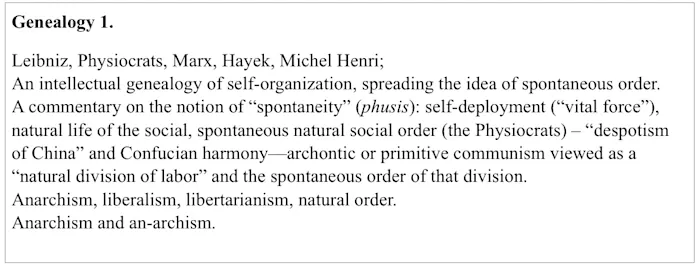
To sum up:
A) The central argument of physiocratic economics is that capitalism doesn’t exist (capitalism in the critical sense of a formation of domination) or is of little importance (monetary illusion).
It’s possible to present this economics (here let’s say the doctrine of market socialism) as the utopia for after the insurrection, after the revolution when the class struggle is done.
What matters is “collaboration”, “association”, even the “solidarity” of capital and labor, in the Pétainist or Gaullist manner.
What is essential is social harmony achieved through the competition of co-participating equals.
Analytically, the argument is that capitalism gets fully absorbed into the physiocratic natural basic economy, except for a bit of “vampirization” to speak the language of economic Negriism.
(B) Contrariwise, the central argument of the critical reflection I lay out here is that this “basic economy” is only an ideological fiction, a metaphysical, naturalist fiction (materialist in this metaphysical sense), and that the only object to be studied is capitalism in the sense of a social political economic universe of internal colonial war.
For critical thought, the object “basic economy”, the sub-capitalist material infrastructure, or even industrial capitalism cleansed of its financial saprophyte, is all a metaphysical conception (hierarchical dualism) to be criticized as such, while unmasking the metaphysical structure of neoclassical or economistic Marxist economics. From this perspective, the whole idea of a non-capitalist economy, of a socialist economy or an alternative economy, etc., comes under the same critique.
2. This political regime Is realized in cybernetics or in the idea of authoritarian technocratic government by experts.
Economics, in its fully developed neoclassical form, rests on the idea that the market is a machine and, further, a mechanical machine (an application of naturalism: the law of supply and demand is natural, like the law of gravitation).
The neoclassical theory provides the market plan, its organigram or its schema of operation (completely geometrized).
The market is thus constructible (one possesses the plan – the essence of neoliberalism: construct as many markets as possible).
The market is also calculable: one can simulate its operation via computer (there you have current mathematical finance; so-called “trading” being only the operation a simulated market with the help of a computer – mathematical finance is just one of the outcomes of planning by means of the simulable or calculable market).
Calculable and completely modelable, the market can be used as an element of planning, as a thermostatic regulator.
The 1930’s of the Great Controversy concerning the possibility of planning by means of the market (see part four) are also the years when operational research, programming, and mathematical and digital planning are deployed.
The question of the possibility of an economic equilibrium (solved by Gérard Debreu in 1950) was framed, before the war, in terms of game theory. The essential role played in this by Von Neumann would have to be studied.
It’s not possible to formulate a coherent critique of cybernetics without going back to the economic debate of the thirties about the use of the calculable market as a means of planning (and hence to the debate about the possibility of a socialist economy).
It’s necessary to drive home that for economists the market is a completely theorized system.
High-Frequency Trading (HFT) and all of automated digitalized finance are only applications of the neoclassical theory of the calculable market. Finance is an exercise of social engineering, directly traceable to the use of economic calculation for planning. Which is why economists affirm that if the Soviet planners of the 1930’s had had the calculating power of today’s computers at their disposal, they would have been able to carry out their neoclassical project.
The work in normative public economy done by the Toulouse School (Laffont) is another application of this mathematical theory of planning.
What this possible genealogy of cybernetics (Walras, Pareto, Barone, Lange, Von Neumann, Samuelson, Dantzig, Malinvaud, Vickers, Laffont, etc.), or, identically, of the mathematical theory of planning via the market, manifests is the need for an increasingly detailed technical “informational” control.
(Finance processes masses of data that exceed anything we know, even in astrophysics, which is why it attracts so many computer scientists; it constitutes a test for the processing power of combinations of machines, which are market simulators.)
The constant, exhaustive, “nano-molecular” monitoring of agents becomes the rule. Eco-Nomic or neoliberal behavior adjustment becomes a necessity (the object of the public economy of Toulouse is to model the automatic procedures for monitoring and adjustment). Isn’t this the triumph of planning that goes by the name of neoliberalism?
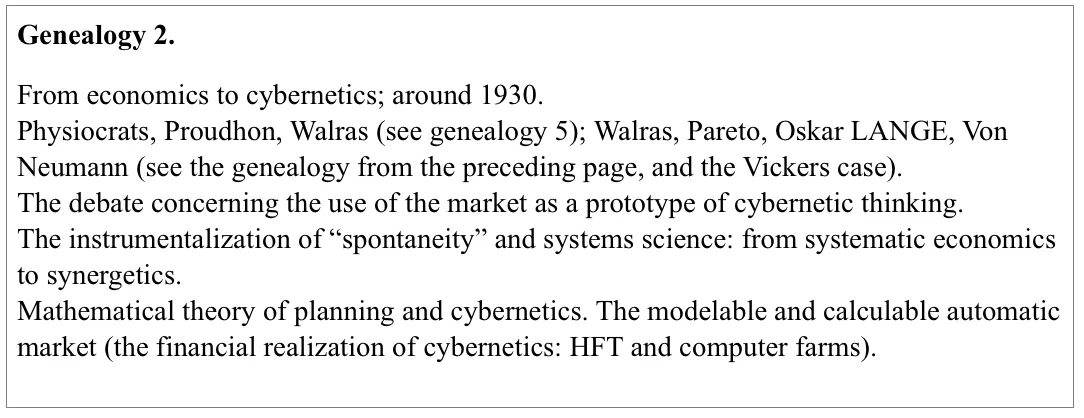
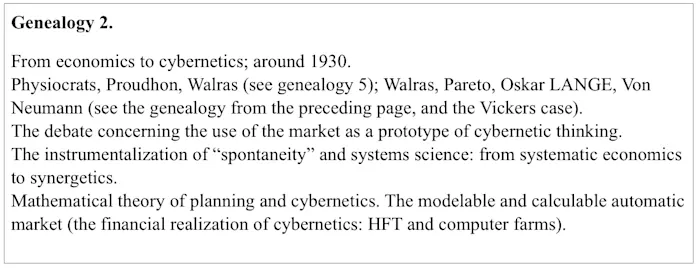
3. Economic technocracy can be presented as the power of the committee of engineers, engineers working for the well-being of humanity.
Let’s start from the critical concept previously introduced, that of the physiocratic basic economy. A concept by which the metaphysical or superphysical structure of economy is manifested the most simply.
There is said to exist a basic economy underlying capitalism.
Capitalism that would only be a veil that would only have to be lifted away in order to access that universal (fundamental, archontic archaic) reality that underpins every society. Every child knows that people must produce (work) to survive.
The task of economic science would thus be to study that sub-capitalist techno-economic infrastructure. To free truth from illusion (monetary illusion, for example), the truth of prices, the natural order that is disturbed by inflation, the immanent communism that is parasitized by offshore financiers, etc.
Of course, as we’ve said, this infrastructure is ideal, indeed imaginary; but more exactly, it forms a corrective utopia to be realized: the utopia of the good economy.
Which explains the normative (and elusive) character, the technocratic political character, of this fictitious economy; dating from the Physiocratic origin of the liberal economist ideal.
For economic thought, it’s a matter of conjuring up this sub-capitalist economic BASIS in order to act directly at its level: act with and upon this ground, in a technological manner (or positive manner: to know in order to com-prehend in order to act: the engineers’ manifesto).
Neoclassical economics, the finished form of this political technoscience, is thus a science of engineers.
Many of the neoclassicals were engineers by training, polytechniciens by preference, and regularly identified themselves as “socialists” (they were often card-carrying members of the Parti Socialiste). One can even say that the esoteric doctrine of the P.S. (and of social democracy in general) is the neoclassical theory of the basic economy. All this could be seen as the culmination of the “economist Marxism” of the Second International, the Marxism of productive infrastructure (then of developmentalism, then of industrial capitalism). We know the central role of engineers in Soviet Russia; Brezhnev was a metallurgical engineer, a tank specialist who would become the principal director of military heavy industry, after being the manager of one of the largest hydroelectric plants with its associated combines – Dniepropetrovsk, the closed military city, the great missile factory, was his fiefdom.
But the idea of a basic economy is a metaphysical philosopheme. Economics becoming applied metaphysics.
The idea of a basic economy is a metaphysical philosopheme, one that can be traced at least as far back as Leibniz. 1
The Physiocrats, Quesnay in particular, read a lot of Leibniz via a propagator of the Leibnizian faith (the idea of harmony, equilibrium, optimum, etc. Reread Candide who targets Wolff: everything is for the best in this best of all possible worlds) very popular around 1750, Wolff, his Droit Naturel, of which Quesnay’s text with the same title is little more than an instance of plagiarism; if Hume is the founder of “Scottish” liberalism, Leibniz is the founder of physio-cratic technocratic economics.
This philosopheme (of basic economy) is, from the origin, fully developed by the Physiocrats (attentively read their name once more: physio-crats=eco-Nomists); whence the common proposition that they are the founders of economics (in the strict sense of technical economics); and that this basic economy (the marvelous object of economics) can be called “physio-cratic economy”, or rather, physio-logical: the material system for the physical provision of subsistence (read: sub-sistence, the “material” basis of life).
Economics (physiocratic then neoclassical) is a material physical science, a science of production engineers.
What is this basic economy, then?
A metaphysical myth; revolving around the idea of (human, toiling) nature. Let’s restate this myth (in neo-classical terms, to skip over the stages):
Tied to physio-logical human nature, a material technical system was developed over the long term, starting with prehistoric man (economy is thus a-historical, it’s “a vital necessity”), a system of manipulation of matter (the system of Physiocratic subsistences, the system of use values or needs).
The mythical history of economics merges with the mythical history of technics (neutral, universal, for the good of all –more Leibniz);
“Manipulation” (= labor, Smith, Ricardo) always refers to needy and thus toiling humanity: work is an ahistorical invariant, theorized by Hegel, reader of Smith, himself a critical disciple of the Physiocrats;
It was in France that Smith, during his voyage of initiation into economics, discovered, through Diderot’s Encyclopedia (a monument to the glory of “materialist” technics), the famous “technical division of labor”, industrial organization.
What is essential, then: economy is theorized as a technico-material system, and this theorization is called “materialism” (Scottish or other, the Physiocrats being “materialists”, already by their exclusion of currency); the Great Figure of economy is the engineer, the production engineer (Brezhnev and the metallurgical combines or the material base of Sovietism!), the great do-it-yourself technician inventor, Jules Verne.
Whence this central property, which is the Achilles heel of the techno-economist physio-materialist doctrine: the separation of the physic-material technical “real,” the productive basis, from the “monetary,” the financial capitalist form (capitalism identified with horrid finance).
All of economist economics, from the Physiocrats to the neoclassics by way of the classics (Marx to an extent), declares that money (= capitalism) is FORM, veil, capitalism is the pure appearance of a deeper economico-technical reality that is studied by economics (which considers itself “enlightened” for this distinction).
A “true” economy (shorn of the capitalo-financial parasitism) that is moneyless (= stateless—and there, once again, you have Smith’s and the liberals’ “civil society”).
So we have, established as early as 1750, a separation between:
The basis, material industrial production, an engineer’s technics, “real” wealth, Pareto’s definition of economy as a material system of chemical transformation of physical objects, with relative (natural) technical prices and a material calculability, the true a-capitalist a-historical, universal economy (Europe’s gift to the world!). This must be the starting point (Pareto and the debate of the twenties and thirties) for dispelling the illusion of a non-capitalist socialist market: a market with bartering, with a calculation of optimization, in the neoclassical manner (once again, the technocratic Physiocratic theory is better understood as a utopian theory of market socialism, post-Proudhon-Walras, than as a theory of capitalism, obviously). “Barter” (as defined by the economists) is to be understood as a chemical transformation of objects, which could be written à la SRAFFA: Iron + Coal = Steel, which is the “exchange” of the neoclassicals (and the economists: exchange is a production and vice versa).
Form, the parasitism of finance, the astonishing uselessness of money, etc.
To summarize: what characterizes economism is the assertion (normative or performative: to be constructed) that economy is the universal technical recoverable supersumable material basis of financial monetary capitalism (in theoretical terms: use value precedes exchange value: every commodity is twofold, use value and price).
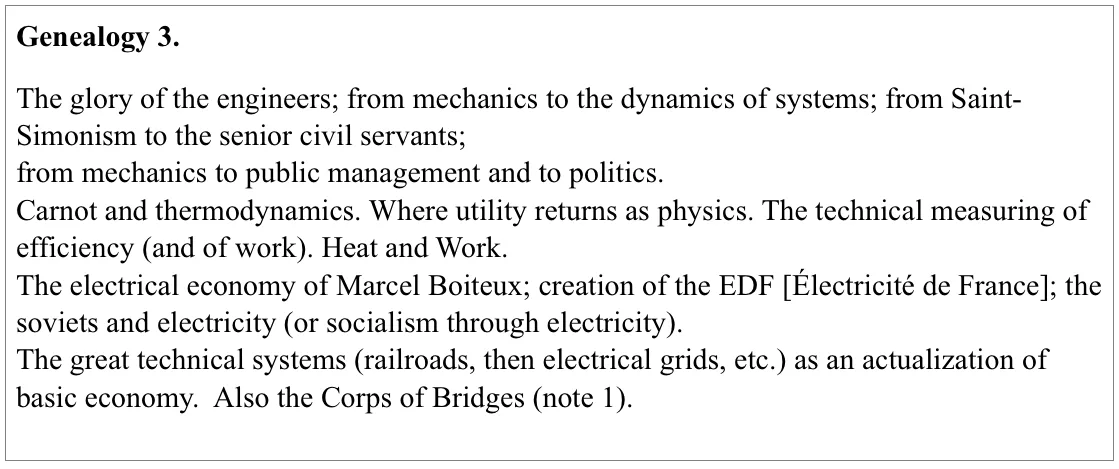
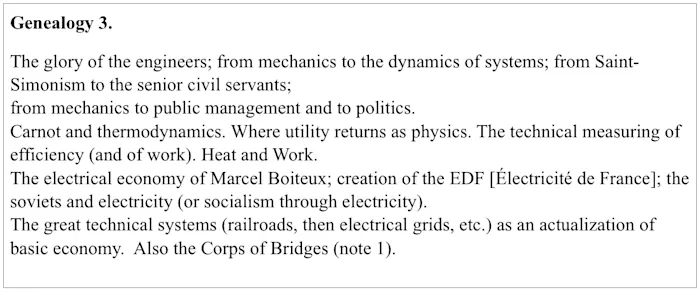
4. The finest flowering of this technocracy is planning, planning by means of the market, which can be called neoliberalism.
Contrary to the classical utopias of the history of political ideas, which remain legends or romances, the neoclassical utopia is an engineer’s program of production of the social, a program that doesn’t recoil from any technical detail, however off-putting it may be.
So the real adversary of Hayek (thought of here as a libertarian anarchist to begin with) is not Keynes (despite the interventionism of the welfare State) but the (liberal planner) neoclassicals or proponents of global planning using local regulators, the market thermostats (a system of markets for which one possesses the mechanical theory or plan).
These “socialist planners and “market enthusiasts” nonetheless, liberal or neoliberal socialists, political engineers of the economy, political commisars of economic behavior, these technocratic masters, are the ones who must be confronted.
Identifying economism as a technocratism allows us to criticize this line of economist engineers (with Saint Pareto, that great engineer of social-fascism, at their forefront) , going from Oskar Lange to Laffont-Tirole and to the technocratic “public economy” of the market.
Consider this theme, then: the Great Controversy over the possible utilization of the market as a planning “tool” (known as the market socialism controversy).
The selected thread is that of the controversy about the possibility of “Economic Calculation in a Socialist Regime”, the Lange-Hayek controversy.
An opposition therefore between Liberalism and Socialism or the Market and the State (or Central Plan), with its contradictory questions:
Is the economy intrinsically “liberal”, which means, linking liberalism and the market, is the economy an autonomous, automatic, self-regulating, self-constituted system of markets?
Or, on the contrary, is the economy “plannist,” is it a national economic system, a system hetero-regulated by the national planning State?
On the contrary, this simply dials up the Great Controversy that structures economism.
Let me emphasize: one can reduce every economist discourse either to a liberal discourse or to a (social) plannist-statist-mercantilist discourse.
But these two types of nominally opposed discourses are economist discourses, forming an epistemic unity, a metaphysical identity.
We’ll verify this proposition by means of an example that is completely paradigmatic.
It’s classically called the controversy over the possibility of economic calculation in a socialist economy. Or the controversy over the possibility of using the market in a plannist regime.
The essential point being that of the techno-social utilization of the market.
Can the market be used as a means, a tool, of planning?
Let’s note right away that this question is of course the same one that we could pose in another syntax: can the State control the economy? Or again: is there a possible manipulation of the economic domain by the political one? Or further: can the economy be “humanized”?
For at bottom this controversy is only the expression of a stereotyped opposition between the politico-police bureaucratic and the democratic liberal economic.
The liberals are “pure” economists, in the sense that they think the economy is autonomous, which is to say, generates its own laws, which are purely economic therefore.
In contrast, the statists, in the name of “politics first,” claim that the State (the embodiment of the political) can govern the economy, an economy that (a) has no laws, or (b) is controlled by manipulable laws.
However, in the discursive field of economism, politics comes down (1) exclusively to a manager-State politics, that is, to the expression of a collective subjectivity (this is why we speak of social/ism), a subjectivity that in order to function relies on (2) the natural laws of the market (the all-too famous law of supply and demand), the way we depend on the law of gravity in order to walk.
And in fact, to go back to the first expression of the Great Controversy (that of the possibility of market utilization by the planning State), the whole issue is whether one can control, manage, utilize the “laws of the market”—without raising questions about the existence of such laws (their meaning, etc.).
The lack of questioning about the supposition (how are they manifested in reality?), indeed, about the naturalness, of market laws (whatever they may be) characterizes economism.
Hence, this first expression of the Great Controversy gets updated around 1920-1940, when the first experiments with national planning begin.
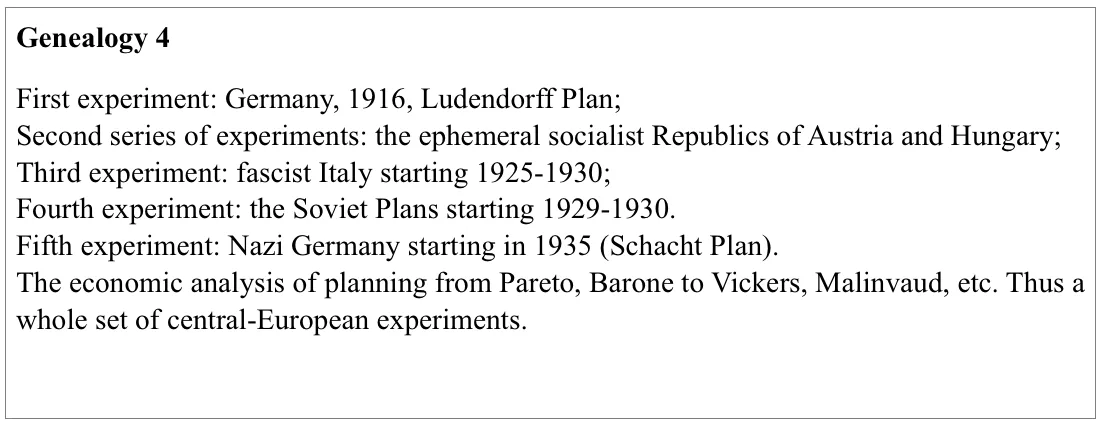
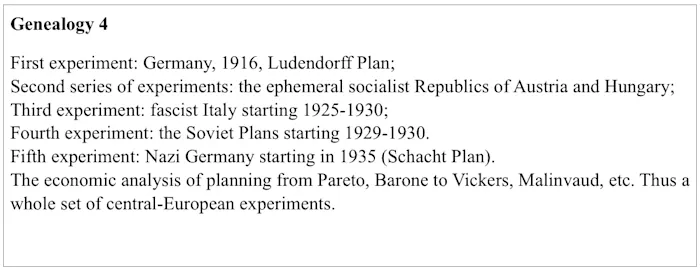
So it’s not so innocently that the Controversy opposes:
(1) the anti-plannist liberal “Austrians,” Mises and Hayek;
(2) and the pro-plannist socialists or corporatist Italians and Germans, of whom the key figure for us is the Polish economist, Oskar Lange.
[The essential work being On the Economic Theory of Socialism, by O. Lange and F.M. Taylor, 1938: “Only the technique provided by the modern method of marginal analysis enables us to solve the problem of planning satisfactorily. Mises’s challenge has had the great merit of inducing the socialists to look for a more satisfactory solution of the problem (of planning). Those of the socialists who did not nor do not realize the necessity and importance of an adequate price system and economic accountancy in the socialist economy are backward not only with regard to the present state of economic analysis; they do not even reach up to the great heritage of Marxian doctrine.” (p. 1420]
Two things should be said, before analyzing the doctrines:
1. Planning is of German origin, both conceptually and practically;
2. And it was Austrians inside the German domain who criticized social plannist (economist) Cameralism.
Because planning is the outcome of this (German) social Cameralism, in so far as the latter remains metaphysical or Physiocratic (organized around the idea of basic economy).
Germany was never dominated by English liberal-economist thought; quite to the contrary, throughout the 19th century, and up to the defeat, it knew only one type of thought, which I would call “national socialism”, whose discursive origin was the Cameralism of Sonnenfeld, or Steuart’s social Mercantilism, which was honored in Prussian Germany.
But this social Mercantilism coupled with the Prussian industrialist State was quickly deployed in philosophical terms, and gave birth to the concept of “corporatist system.” We’re aware of the success of this theme in Germany, beginning with Fichte and his Closed Commercial State.
This type of thinking that dominated Germany (under the name Kameral-Wissenschaften, to be translated here as “sciences of national-economic management,” a management practiced by the Imperial Chambers or the Productive Ministries) attempted to establish a scientific politics.
Although non-liberal (in the strict English sense), this thought is naturalist, based on the liberal ideology of spontaneous economic laws. This Prussian-supported Mercantilism corresponds therefore to a naturalist reintegration.
So these two versions (liberal versus cameralist-statist) should be read in terms of a bifurcation.
Hence Austrian liberalism, à la Mises, dominated by German thought, is first of all an internal critique of Cameralism, of this state-supported Mercantilism, taught in Austrian universities. An Austrian debate, then, but exerting a strong influence in Italy, partially Austrian, since it was in 1908 that Pareto’s student, Enrico Barone, wrote the celebrated text, The Ministry of Production in the Collectivist State.
Oscar Lange, a central figure in all these controversies, was a student of the Walrasians through Pareto (like Barone).
The controversy developed therefore on the basis of an internal critique of Cameralism (conceived as a particular economism).
And had to do with the nature of economic laws: manipulable or not.
The “Austrians” held that the market was a spontaneous and uncontrollable social process.
And there were Walrasians, like O. Lange, who maintained that in a socialist economy a technicized, mechanized market process could exist and be utilized by the national planning State.
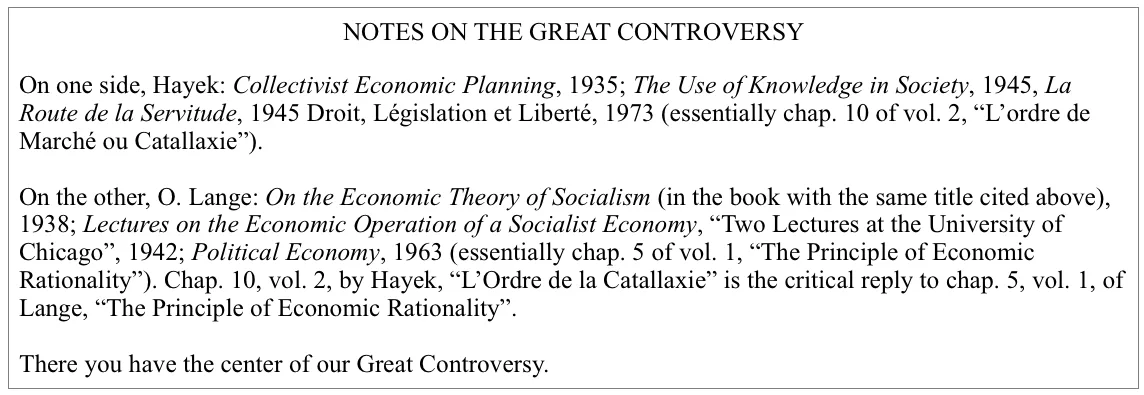
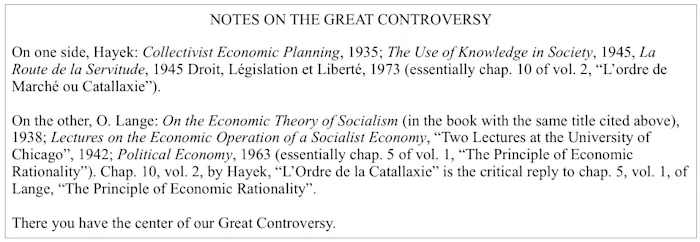
(A) Lange and the “socialist” disciples of Walras and Pareto attempt to explain that economic science furnishes the “true’ model of the operation of the market, the neoclassical model.
This theory authorizes them to counter “Austrians,” on this question of the possibility of market socialism.
Indeed, once he possesses the law regulating market reality the economist can become the engineer of the social. Like the physicist uses the law of falling bodies to make pendulums function, he can use natural law for the Good of all, and thus transform into a technologist.
The “neoclassical socialists” think by following the sequence:
(i) There is a knowable natural law of the social (thanks to the Walrassian theory—naturalist, but also liberal, for the level at which the law is automatically carried into effect).
(ii) There is a technical utilization of the law;
(iii) For the sake of the collective Well-being, a Well-being defined democratically by the State (a function of collective utility).
In this way the economy can be “democratized”, subordinated to the political, as a simple means to a collective end, inasmuch as this naturalist (and neoclassical) politics complies with natural law.
This constitutes the essence of neoclassical socialist thought (envisaged as a political technology): management will follow political choices, to the extent that these “discretionary” choices are formulated in the grammar of the natural law of the market.
(B) In this idea of subordination of the economic to the political, Hayek sees the origin of totalitarianism.
Even the idea that the State, in order to subordinate the law to itself, must subordinate itself to the law, does not stop Hayek’s criticism. The whole neoclassical construction, which authorizes the Langian mirage, becomes harmful from his point of view./
We know that Hayek hesitates on this point: wouldn’t it be more radical to affirm that there is no law? Abandon liberalism to go towards an-archism?
And thus no socialism (scientific socialism, metaphysical in this instance), which requires the liberalism of natural law for a ground.
But the obliteration of the (scientific, metaphysical-materialist) socialist dream would also annihilate the liberal mirage, which is basically identical to it.
So Hayek stays with a theological naturalism.
And returns to his definitional identity: technically-oriented cameralism= totalitarianism (this cameralism resting on the idea that politics can decide about economics, thanks to the very laws of the economic, if such laws exist).
And Hayek will spend his entire long life trying to show that O.Lange’s scientific cameralist idea is a fatal error.
Hayek’s great adversary is Oskar Lange and his “Democratic Planning” (and his self-management in particular). Because for Hayek self-management, to be understood in the technicized cameralist sense of economic management by means of economic laws, but for political goals, such as Well-being, is an impossibility. Impossible to divert law from its spontaneous course, to appropriate it, nationalize it, democratize it, humanize it.
So one sees the Hayekian strategy, and its meta-physical character.
It’s not a matter of denying the law, but of denying its manipulatory or instrumental [outilitaire] character.
Why isn’t the law of the market instrumental?
Why can’t the law of supply and demand be manipulated to get it to produce a socially desirable effect?
Well, because that law is not a deterministic law (even if it is natural, physical); it’s not a deterministic mechanical law (as the neoclassics were prone to think). The Austrian critique of the simplistic neoclassical theory thus undermines the basis of Langian instrumentalism [outilitarianism ] by threatening the economist dogmatic itself.
The law of the market is not a mechanical law, but a social political law.
Of course the market remains subject to the law, but this law is inaccessible to any constructivist practice of the neoclassical (market-socialist) kind.
The social law of the market is not of the same type as a physical-mechanical law. Physical law is external to man. The social law constitutes man internally as an economic agent. Man exists, in this second constituent case, only through the law.
Manipulating the law in this way means changing man, attempting to create a “new man.” Manipulation of social law, in a Saint-Simonian, Taylorist, or Langian manner, and in response to the principle: there is a controllable law and the economist is the engineer of that law, entails a violent action on man, a strong modification that is the basis of totalitarianism (as Hayek understands it).
The great manipulating engineer of the social, à la Lange, is a dangerous fascist; he thinks as if man were the object of a project, and takes him for a target.
So the Great Controversy opposes:
1. The individualist liberals who want to protect man against the evil fascist State, by rendering untouchable the laws of the social, considered as “traditional” and formed slowly (and free of any human control).
Hence the liberal principle: hands off of the market, let it operate on its own. This is supposed to bring a guarantee of individual liberty – a liberty preserving the Order of the market.
From this viewpoint, simplified, Hayek is an anarchist, in the anti-statist sense.
But it’s necessary, and Hayek saw this clearly, to justify (establish) this anti-statism. And this anti-statism, once established, doesn’t permit political compromises.
Justify means establish rationally. Hayek tells us: “I have good reason to refuse the State.” And this reason is fundamental.
If the world is organized, is in order, which is to say respects a law, if the law is natural and spontaneous, if the law expresses the movement of things themselves (the meaning of spontaneous: from “spa”, space, spacing, self-movement), then laisser-faire is the only way, because it’s not possible to alter the functioning of the Law [contrefaire la Loi].
The whole Aristotelian metaphysics, and its basing of politics in nature, comes to Hayek’s aid.
For it’s clear that this anarchism of the law’s indisputability is a hyper-archism of that law, a deism of Smithian origin. A new theodicy.
2. The socialist neoclassicals place collective Well-being at the center of their thought. And the State, a democratic embodiment of the collective, via a recognized political process, must be able to use the law for its sake, for the benefit of all, if it’s to avoid “intervening” in man’s existence, “degenerating” into a fascist totalitarianism (with an ideology of the “new man”).
Like Hayek, the neoclassicals believe that the world is in order.
Moreover, the order of the neoclassical world is the same as the Hayekian catallactic: it is the Physiocratic natural order.
Lange needs natural law as much as Hayek does.
But in a more technocratic spirit, the neoclassicals suppose that that the law can be diverted or utilized on at least two levels:
1st level: the order is basically rational, but the existing world is imperfect – one must correct the imperfection by shaping the market; but doesn’t Hayek say the same thing?
2nd level: the rational must be set free, and so it’s necessary to intervene. Neoclassical political economy consists in charging the State with perfecting the imperfect by following a norm of action, a norm that defines economic calculation, a calculation that is itself based on the law. Although interventionist, or interventional, rather, the neoclassical State is normed by the teleonomy of the market.
Thus, either one can say (i) the State intervenes, leaving it at that, and one is taken for a plannist, or one can say (ii) the State intervenes to liberate the rational, or embraces the terms of the law and therefore self-dissolves through its own action. In this way market socialism should lead to the disappearance, the withering away of the State, the resorption of the State into the market. (And here again is one far from Hayek?)
So we re-encounter one of the defining theses of economism: there is a unity of contraries (in this metaphysics that ends up with an economy-world).
Hayekian anarchism, itself an end product of Smithian naturalism, is only the reverse expression (with an identical structure) of the rational plannism of the neoclassicals. The unitary basis is the natural law of the market. There is no economism without catallaxy.
This opposition within unity has traversed all of economy [economics] since the 18th century (at least). The opposition between the (neomercantilist technicist) State and the (liberal) market constitutes the unity of economism.
One doesn’t escape from naturalism by claiming that the State has the task of hetero-organization of the market, once this task is normed by economic calculation. For the State is thus brought under the law of the market. As the opposition harbors a unity that is apparently invisible to the eyes of the economists, it’s normal for it to unfold in the form of repetition.
5. All these developments make it clear that alternative economy is a mirage, but an economist mirage: the mirage of an alternative economy or an alter capitalism.
Let’s set out the problem that we’ll develop in this part:
Social and solidarity economy (SSE) is tied to, is even the “brand” of, the social Republic, the conservative republic that continues the social authoritarian Second Empire and asserts its power by the defeat of the Commune; the SSE nestles inside the conservative social State.
Social Republic, social State, and social economy form inseparable elements. Recall also the well-known connections between the most conservative social democracy (the PS, in the style of the U.S. Democratic Party) and the social economy nebula.
Do these phenomena hint at an alternative?
And what alternative?
Let me indicate straight off that when it’s a question of the SSE constellation, it is likewise a question of the constellation or nebula (so important for France) of Social Christianity.
The old question of the Third Way.
Consider, then, “The Third Way” that characterizes the SSE constellation: third sector, third world, etc.
The Middle Way 1 — neither capitalism, nor socialism, nor a fortiori, God forbid, communism– with its harmonics:
The Third Way (Christian Blairism) articulated around the theme of SOLIDARITY; the Solidarism of Célestin Bouglé, the mentor of MAUSS (the odorous Christianity of Alain Caillé is typical); Associationism, institutionalized by the republic through the law on associations, one of the beacon laws of the social republic;
The solidarity economy and the cooperative economy; etc.
Let’s immediately note the close connection with Proudhonian anarchism 3, which is a republican anarchism that is compromised, however, with the Second Empire, (that authoritarian social Empire which the conservative Republic will only continue).
Proudhonian anarchism is the most limited imaginable: it’s an economist anarchism, based on the idea of a regulation of conflicts through economic equilibrium and on the idea of the realization of justice through a pure and perfect competition (without oligopolies, etc.)
Let me emphasize: the economism is typical of this kind of “equilibrium” anarchism that leads to the neoclassical theory.
Proudhon, Walras, and Lausanne still need to be linked:
Canton de Vaud: 1860, Proudhon is crowned by the Conseil d’État of Canton de Vaud for his essay on taxation;
1871: Walras takes refuge in Lausanne
It would be worthwhile to restudy Proudhon, especially his writings from 1850 on: the Republic is a positive anarchy; liberty is economic organization; the free contract and competition are placed at the center of social organization, which is to be defined as the economic order of self-organization or catallaxy.
Here we re-encounter the genealogical link beween Proudhon and the Physiocrats: society is based in eco-Nomic sub-stance.
This brief inventory enables one to see that with the Proudhonian, neo-Proudhonian or neoclassical Walrassian social economy it is a question and only a question of economy: the social order of justice is an economic order (which is the Physiocratic thesis).
As with productivist developmentalist Marxism, but in a different way, the economic question of social organization remains fundamental, remains the basis in a position of command.
Of course, one can think in terms of an “alternative economy,” but it’s still a matter of economy.
So the question arises: does there exist anything like an “alternative economy”?
Or to say it differently: is the alternative economy a non-capitalist economy?
Is there non-capitalist economy?
Can economy be conceived without capitalism?
In SSE thinking, the answer to this question (of an alternative) refers us back to a reformism where it is only a question of tempering, humanizing, etc. capitalism.
For a long time it has not been a frontal opposition to capitalism, and is now nothing more than a reformist game on the fringes.
This reformism, where it is a question of “tempering” capitalism, is framed economically.
(1) Maintain WORK as the central value: the Work ethic, the moral role of the Worker, the slide toward Workfare or welfare, etc.
(2) Deploy the third sector.
But is this a matter of companies (perhaps cooperatives) on the medical fringes (CARE sorts of initiatives)? Where medico-social work becomes dominant, with the new central place of the HANDICAPPED, as a détournement of the capital/labor conflict. Where, in this third sector, one re-encounters the old decision of social Christianity: to reject conflict.
Proudhon, Walras, and economic equilibrium still.
(3) Maintain the economic structures, indeed defend and improve them (cf. the Emmaüs technocrats of the social, such as Martin Hirsch); the whole spirit of the solidarity doctrine of the social Republic, which is elitist, conservative, bourgeois.
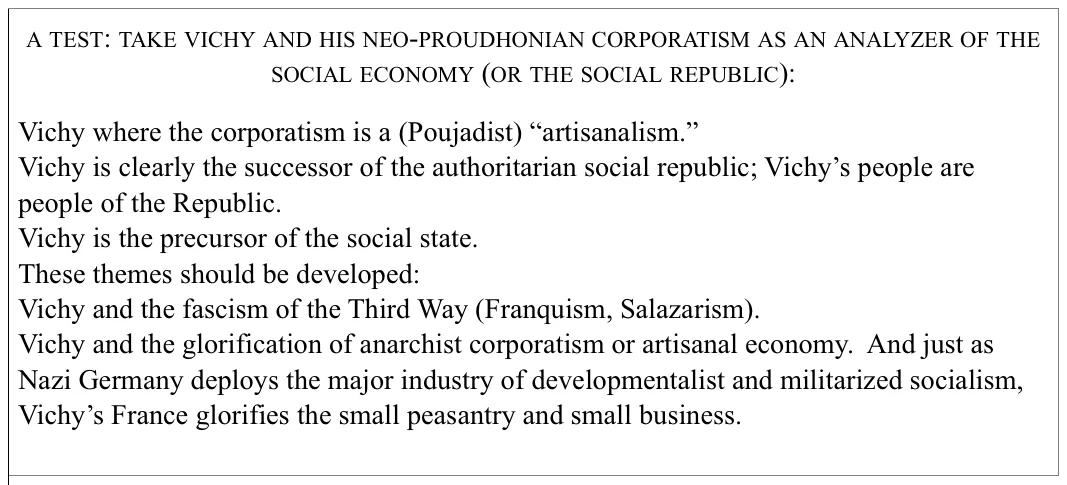
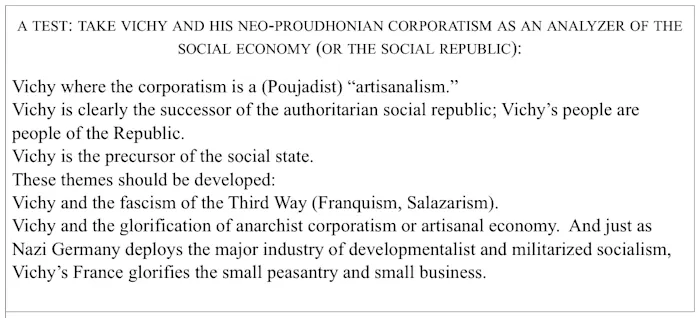
The socialist economy appears as a saprophyte of the capitalist economy.
Organized in a Christian manner around a (somewhat) methodical charity, and financed by a limited fiscal redistribution.
Solidarism or associationism is an economism: its reality is a sub-optimal economic organization subsisting on the tolerated fringes of capitalism.
It’s an integrated, internalized, functional element of a conservative republic with a social democratic management, and which likes to show an alternative, but one that is peaceful, peace-loving, pacified, and obedient! And above all an alternative to the economist communist project of a nationalized major industry (the anti-communist and Atlanticist basis of social democracy shows through everywhere you look).
Let me repeat: the third, cooperative way is first an alternative to communist intitiatives before being an anticapitalist alternative.
After this brief overview, an introduction to the SSE, I’ll offer a few elements of the solidarity theory, examining the links that connect this solidarity doctrine and the neoclassical Prudhonian Walrassian theory of general equilibrium, a theory that presents itself as a theory of justice by means of good economy.
In this presentation, the brief overview of the SSE, behind all the debates (since Proudhon at least), there appears an implicit question, that of the “social organization” or “social order” that are established on an associative basis.
How can a society be re-established on the basis of a federation of voluntary associations?
This is the typical social question of the 19th century, canonized by Marx: how to conceive of conscious self-management?
Take, for example, a cooperative system, organizing production cooperatives on a global scale (regional at the least, hence with a division of labor and obligatory exchanges), service cooperatives and consumer cooperatives – copied from an industrial capitalist schema, but where the economic units are solidary, associativist centers of cooperation.
Disregarding the organizational (cooperative) level, society can be seen as “an association of voluntary individuals”.
But this definition is completely deceptive. As I’ve indicated, the organizational level is reduced to being a black box.
The social question, the political question which this organization is meant to resolve, is blanked out.
As a matter of fact, the social question, posed as the political question of insurmountable conflict, division or cleavage (of alienation therefore), risks being eliminated, forgotten.
Which is why Hannah Arendt said that Marxism (as the prototype of this self-management style) staked too much on Leibnizian HARMONY.
Refer to part 3 and to the citations connected with Leibniz, Quesnay, and Marx (p. 10-12).
The spontaneous harmony of catallactic organization or the natural social division of labor: this is the theme of equilibrium or Proudhonian justice that always comes back.
In practical terms, we know how the social question has been depoliticized, has been pacified.
For example, by promoting a syndicalism of co-management: is there a place for a union in the cooperative? This was precisely the idea of the prohibition of unions in the USSR, since “social democracy” was directly ensured by the cooperative organization!
Also by domesticating “association”, by emptying it of any fighting substance, by making it institutional and grinding it into a chaos of associations, etc.
We have witnessed, under the auspices of the conservative social republic, the degradation of the militant community or the phalansterian phalange into a “voluntary association” deprived of any social or justice objective.
In this institutionalized framework of forgotten conflict, of elimination of division, [by means of] the participationist impulses common to Vichy and the Gaullist 5th Republic, the question of the cooperative order, the pacified social question (this pacification being the task of all the States since the Second Empire 4) could be addressed in tranquility.
Let’s restate the question: how is social organization— solidarist social organization, say – to be constituted through an economy of competition?
Imagine, then, a cooperativist or associationist socialism. Classically, let’s call the associative or cooperative space: “civil society.”
One can then say: associationism is the (depoliticized) politics of civil society, is the mode of its harmonious organization as an “autonomous” economic totality. Which can take a social democratic form of the economy through it’s “humanization”; or the more combative form of the perspective of an alternative social economic political order.
Principles of the alternative:
–economic decentralization,
— designing human-size production units allowing co-management (but with what content?),
— relocalization, or, at worst, regionalism,
— a reversion from the “Great Society” (Hayek) to the small society (where small is beautiful),
— a transfer of the missions of the welfare State (such as education and health) to cooperative organisms, etc.
So there arises the problem of the alternative order or the federation of cooperatives. But note the essential point: the cooperatives (or solidary communities) are seen solely through an economic lens, as “management units.”
This implies: developing and highlighting the management capacity; so the big problem is raised: can effectiveness be rethought beyond economic effectiveness or must profit be maintained as the indicator of effectiveness?
So how can cooperative organization be conceived insofar as it’s outside the economic web? Because it is a matter of economy, alternative though it may be.
Thus: will the general set of cooperatives be a market?
Will the harmonizing role of perfect competition (Proudhon/Walras) be maintained?
If the market and competition are eliminated (or rather: if the State becomes an internalized market), isn’t there the risk of (re)constituting an economist neo-corporatism (cf. the “solidarist” project of Vichy, a détournement of the social republic project, which was itself a slick cooptation of anarchism).
Associations, cooperatives, etc. are always in danger of morphing back into corporations (that central element of the various fascisms) or into capitalist enterprises, as long as the question of the necessary conflictuality of association is not raised, as long as the ideology of volunteerism or “service” is not critiqued, and as long as the association doesn’t face its own congenital corruption into a frozen institution, the “driving belt” of the solidarity State.
It’s significant that thought focused on solidarity economy (at least since Proudhon) has not addressed the great political question of reification; conflict, division, and separation in voluntary association are shrugged off.
The idea of corruption of the community is not even imagined, let alone analyzed.
That is why these socialist associationist attempts have actually degenerated, in the course of their implementation, into (fascist) organizations or into identitarian communities (possibly religious or quasi-religious, a return of organized charity; of course the associationist attempts degenerate, stupidly I would say, just as often into capitalist enterprises; where they are regarded as remarkable successes (enterprises through integration).
Behind associationism there is an unhealthily optimistic idea of spontaneous Harmony (as in market harmony) that relates to the deep meaning of economic equilibrium.
How is neo-Confucian social harmony to be maintained? Here you have the republican corruption of the social republic, the self-government of associated citizens according to Jean Jaurès, Benoît Malon, and Eugène Fournière.
The key theoretical question of self-government or self-management is not resolved, therefore, because of not being addressed correctly in political terms (of conflict) instead of in economist (Proudhonian and Walrassian) terms.
In order to distance oneself from the illusion of spontaneous harmony, one must constantly raise the theme of the struggle, conflict, war, and inequality that fracture civil society and make it so that cooperatives are, in “realized reality,” therapeutic establishments.
It’s necessary no doubt to lay out comprehensive schemas of thought, “utopias”, to specify types of “organization” (but that is what must be fractured: productive organization, to be replaced by the non-economic community) communal forms of life best able to maintain the freedom to create or to act.
The debate on association is then shifted towards a different debate, more promising this one (less economist), that concerning defiance, concerning the place of refusal of work and the Refuseniks, the place of revolt.
Now we can speak of “projects.”
And here we’ll compare the “solidarity project” with a “communist project”, communist in this case meaning Federation of non-ecoNomic Communes (a communalist or communard project).
The cooperative project is a project (of organization) of production, 19th century style, Marxist as well as Proudhonian.
Obviously in the 19th century the social question could (as a matter of urgency) come down to the question of material misery, working-class destitution, what was called under the Second Empire: pauperism.
It was in this period that “social philanthropy” organizations appeared (this is where Villermé, Le Play, etc. should be placed.)
Anything but autonomy or emancipation (of the proletariat). Administered charity instead.
But for us “developed” ones, classical pauperism (material misery) is no longer in the foreground.
Displacing inequality without eliminating it 5, capitalism, from its own basis in alienation, with its own conditions, has “resolved” the question of pauperism, by shifting things from material misery (via the monstrous path of rapid industrial development, at first a source of material impoverishment) to moral misery in material abundance (albeit relative and uneven). The lesson of 1968 and especially Situationism should be our viaticum.
Our starting point, “in situation,” is not the material misery of the 19th century, a misery that justified “putting to work,” with the illusion of renewing capitalism, of reorienting it; our starting point is moral misery in abundance, under the despotic, non-egalitarian conditions of capitalism.
Once again, it was in the productivist framework of the organization of labor that the solidarist cooperative project is to be situated, that living fossil of the 19th century.
Moral misery in abundance (the misery of wealth) along with non-egalitarian despotism are the battlefield, the situation, the locus of struggle where we try to maintain “fighting communes.”
These communes are not collectives, solidary associations of producers, or communities, with their identitarian, traditionalist, or localist tendency, and with an essentially economic objective, production cooperatives.
The commune is an inventive community, non-identitarian, open, “universal”, breaking with regionalism, etc.
The primary objective of the commune is not production, but constructing a form of poor life that lifts one out of moral misery (mass isolation in consumer society).
Fighting communes of Humans in Struggle; which do not defer, to a mythical “after the revolution”, the possibility and the construction of en enriched life; and which connect this enriched life immediately to The Struggle, and vice versa, and not to production, even in collective self-management, thinking first in situation, then preparing the rich life of the future Exit from economy (even alternative economy).
For communism (that of communes) the place of production is secondary, therefore; and no doubt this “production” will be “intellectual’ first of all (without being cognitive work!) since we’ll have to study, analyze, transform the techniques and technologies which are propelled by capitalism and which are not recoverable as they stand (contra Negri).
The fighting commune is thus a center of thought, first of all, a center of acting-thinking and not of work.
The intellectual task of critique, invention, action, the spiritual or affective task of constituting a rich life, of injecting life back into survival, the political ethical task of destroying non-egalitarian despotism, these tasks are those of emancipated, liberated, autonomous communal life.
Once more, communal life is not that of a production cooperative (turned toward management), but that of a monastery where the communist conditions of life are elaborated.


6. We can close the loop, then, by trying to understand the meaning of this economy that wrecks everything, with the help of a critical analysis of value.
One could formulate an operaist critique of any idea of an “alternative economy”, or any attempt at “humanization” (supersumption) of capitalism (such as the SSE). The idea of a “Universal Factory,” of a social factory, the Deleuzian society of control, of real subsumption, implies the impossibility of autonomy WITHIN an economic form of organization (techno-material with neoclassical exchanges, as defined by economics) or WITHIN a (mythical) alternative economy, since (contrary to the economist myth) the technical economy is necessarily an element of the despotic order of capitalism.
The critical identity: economy=capitalism can be read in operaist terms of “factory society.” Real subsumption prohibits any supersubsumption or refashioning.
It may be useful to return to the critical analysis of the basic economy philosopheme, by looking at things “in reverse order”, starting from the anticapitalist project, and asking the question: what anticapitalism? Is anticapitalism still an economic project?
The anticapitalist positions are graduated of course: from the defense of a veritable capitalism of entrepreneurs (inventors, engineers, etc. as against the financeers) one goes moderate or timorous reformism, the idea that one might choose among the types of capitalism (it seems there are five types); and at this level of verbal anticapitalism is found the defense of the “Golden Age”, of the Keynesian welfare Sate (which was definitely a capitalism!). Since this latter position is a marker of the “classical left” (today Front de Gauche), it deserves to be discussed, because it rests on the idea of a non-capitalist economy.
So it rests on the preceding dualistic separation economy/capitalism (content/form) and on the idea that there exists a basic infrastructural economy. Infrastructure classically defined as locus of productive organization, of technology, etc. (reread the texts of Panzieri) with all the economistic Marxist clichés, such as the horrified rejection of the idea (à la Panzieri) that technology is essentially perverted by capitalism.
Or, inversely, the idea that capitalism is only an accelerator of a universal creation (for everyone), in short, that technology as it is, is recoverable (supersumption is possible). In a totally metaphysical way, this basic economy is supposed to deploy in a spontaneous self-organization (genealogy 1); to comprehend this, one can study the caricature of operaism constructed by Negri: the productive multitudes who make it so that “all that is, is good”, all the existing techniques are usable; they’re simply being “parasited” by a capital that is alien to the praxis of the productive multitudes (this Leibzian fallacy is crucial for the neoclassicals: the subjective preference is always, without distortion, revealed by the realized prices.)
Let’s go to the core of the disagreement.
And let’s start, for the first time here, from the question of value.
Value does not relate to labor (as in the classical “labor value”); it consists in a policing measure, in a strong sense.
Measurement is not a function of what is measured (whether material or immaterial), but is a question of commensurability, homogenization, of situating in a unified space, and, for us here, always in an accountable monetary space. This is a political question (which can be called permanent primitive accumulation).
Value consists in accountable monetary measurement.
Labor itself is just an element of this homogenization; it is “abstract”, becoming accountable monetary wages (undifferentiated labor).
Measurement is not an attribute of the objects supposedly measured. It’s the expression or manifestation of a social order that rests on a political unification achieved through the construction of an abstract, numerically calculable space. The (non-foundational ) “basis” of the measurement is the deployment of a historical social form. Economy capitalism is defined by value, by putting into measurement, by real abstraction. The “basis” of measurement is not labor, therefore, but a form of regimentation (establishment of a political economic regime), of expropriation or capture of human energy (a channeling of action, and not merely a putting to work, a control of all creativity that cannot be reduced to labor – the essential creation being institutional creation or creation of forms of life—that creation must be severely restrained).
In this political analysis of capitalism, the question of labor, which relates to the question of productive economy, is rejected as irrelevant. Capitalism is not a mode of production, but a formation of domination. Orthodox Marxism is therefore “materialist” in the Physiocratic sense of the term: the essence of society is production (labor) for the satisfaction of physiological material needs. This (false) materialism is a (veritable) economism, and often of the worst productivist kind (here again Soviet economy or Stalinist developmentalism). The satisfaction of needs (starting point shared by all economism) justifies the authoritarian order of production or labor.
The definition of value as a measurement breaks with very form of economism (by repudiating the Physiocratic metaphysics of needs, production, labor, etc.). The notion of value is thus no longer considered in a positive manner, as an unconditioned and transhistorical means (like labor itself, an “anthropological invariant”) or as a calculable “tool” of necessary organization, or, further, as a calculation support for an “anti-expertise” or for managing “more efficiently” (Leninist practice being definable as the locus of recovery (socialist to be sure!) of the best “tools” of capitalist organization). Value is the manifestation of a fetishist social order; and, far from being a sign of progress (in terms of social physics or applied math), is but an expression of historical reinforcement of despotic rigidification.
Despotic control is necessary in order for money to become the “general equivalent.”
This system of fetishistic, archaic, or savage measurement subordinates humans to an abstract calculative configuration (“the law of the market” or of “everything is measurable”). The members of society are thus violently isolated, “individualized,” subjected to personalized (and hence inquisitive) abstract measurements that appear natural (or scientific) or appear to be the intrinsic property of “progressive” technical systems (or the technical objects of those systems). If persons are thingified, transformed into simple elements of accounting, technical things (or commodities ) become, conversely, not just alive but dominating. Here there is a capture, a real abstraction, a domination, a political order which alone authorizes the reduction of human action to labor, and then exploitation stricto sensu. But this exploitation is not conceivable without the despotic authority of the economy and its categorizations.
The politics of this critique of value demands that we break the conceptual chains of production, and thus reject any form of alternative that is still economic. This politics does not lead to a non-capitalist alter-economy, but to non-economy, to the Exit from economy.
A possible conclusion
We can take the economist illusion of the Marxism of the Second Socialist International as the prototype of all the illusions of an “alternative economy.”
The idea that UNDERLYING capitalism there exists a basic economy which would be the foundation of a humanized alter-economy, since capitalism would only be deploying and at the same time perverting that hidden economy, the idea that it might be possible to recover that universal economy, restore it to a state beneficial to everyone—this idea, foundational to the West, is purely mythological.
The idea that it would be possible to mobilize the economic science of this mythic basic economy as an alternative to capitalism, while no longer needing to critique a bourgeois dogmatic (a neoliberal one for example), the idea that it would be possible to easily utilize a technoscience of the market or a rational and scientific super-management—once again, this idea is metaphysical (and a constituent element of our disaster).
It has become clear—I have heavily emphasized this theme – that the economist illusion of an alternative (socialist, social, humane, solidary, etc.) economy is metaphysical and hence simply a supplementary circle of defense of the West.
The theme of the basis, the basic (archaic archontic), etc. suffices here for this characterization. We could add the theme of unity, of system, and finally of equilibrium and harmony.
The doublet economy/capitalism repeats a content/form duality around which economic technoscience revolves: real value, real price/monetary value, monetary price, material production, universal labor/circulation, expenditure, etc. are constituent doublets.
Now that the illusion appears as a fetishist illusion, it’s possible to shed it. But that can only be the first step, necessary but obviously inadequate – the failure of critical thought is instructive – it points toward heresy and secession, the communist exit via the fighting commune.
Translated by Robert Hurley.
Notes
1. Leibniz, the first capitalist economist engineer; mathematician, inventor of differential calculus, which enabled him to put the Principle of the Maximum into mathematics by means of the calculus of variations; engineer, inventor of salt mining pumps (as an owner developer of salt mines and hence a capitalist).I’ll mention a few texts that will flesh out the genealogy Leibniz – Quesnay – Marx: (i) Leibniz, 1700, Monadology, pp. 88: The harmony between the physical reign of nature and the moral reign of grace (of providence) ensures that things lead to grace by the very paths of nature; (ii) Quesnay, 1750, Droit Naturel, pp. 52-53, then p.54: “Men joined together in society must be subject to natural laws. These natural laws are physical or moral. Physical law is to be understood as the regulated course of every physical event in the natural order which is obviously most beneficial to the human race. What is meant by moral law is the rule of every human action of the moral order in accordance with the physical order that is obviously the most beneficial to the human race. The foundation of society is the subsistence of men and the wealth needed for the force that must defend them. If government is lighted by the torch of reason all positive laws harmful to society and to the sovereign will disappear”; (iii) Marx, Capital, Dognin edition of the different versions of Book I (Chapter 1). First German edition, pp. 83-85: “All use values are commodities only because they are products of private labors exerted independently of each other, private labors which, however, materially depend on each other, inasmuch as they are particular yet autonomous members of the natural and spontaneous system of the division of labor.” Fourth German edition, p. 217: “Objects of use become commodities only because they are the products of labors carried out independently of each other. The complex formed by these private labors constitutes the ensemble of social labor. These private labors thus affirm their quality as ramifications of the ensemble of social labor. The social interconnection of these private labors exists materially in so far as they are members of a natural and spontaneous social division of labor and hence by their products satisfy the different sorts of needs whose ensemble constitutes a system that is also natural and spontaneous: the system of social needs.”↰
2. Neither capitalism, nor socialism (nor, obviously, communism), the Third Way had its most glorious hours as a support for authoritarian (national social) regimes.↰
3. This compromised anarchism which became a reference theme for the French State (corporatism, artisanal society, cult of the little man, etc.).↰
4. The Second Empire came following the failure of the socialist revolution of 1848; the Third Republic was established on the rubble of the Commune; the French State of Vichy was a settling of scores with the political thrust of 1936.↰
5. It’s important to keep pointing out that inequality is essential to capitalism, as a means of productive efficiency, as a means of incitement, motivation, indeed illusion – the lottery that enables the “lucky ones” to become millionaires.↰